Unite the left, etc, etc .. strange vibrations just go on and on?
Feb 16th, 2006 | By Counterweights Editors | Category: Ottawa Scene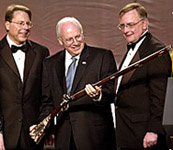
Three musketeers
At least many Canadians have to find it a bit odd that their new Conservative minority federal government is laying plans to ease up restrictions on long guns, just when the big news that won’t go away stateside is all about how Vice President Dick Cheney has accidentally shot one of his good friends with a long gun. Andthis particular ironic juxtaposition seems just one example of a larger new syndrome in North America north of the Rio Grande.
Prime Minister Harper, e.g., has also just appointed the Toronto business leader and former Brian Mulroney cabinet minister Michael Wilson as Canada’s new ambassador to the United States. This carries on with the theme of reassuring the Ontario private-sector power structure about the new federal Tories from Alberta. And Mr. Wilson is already talking about better official Canadian relations with Washington, and so forth. But, watching the mirthful abuse being heaped upon the Bush-Cheney juggernaut on US late-night TV this week, it was hard not to wonder whether better relations with a sinking ship is actually all that good an idea.

Mr. Harper and Mr. Wilson
Meanwhile, new Canadian Liberal interim opposition leader Bill Graham has at last injected what may be the beginnings of clarity into the continuing underlying confusion of the federal scene in Ottawa. The Liberals, Mr. Graham says, won’t be propping up the Conservative minority government in Parliament, even if it does mean yet another election soon. If anyone is going to help Stephen Harper, it will have to be the New Democrats and the Bloc Quebecois: “They’re the ones that created the Harper government. They’re the ones that are going to have to accommodate it.” They “will have to decide whether they want to compromise on this, because they’re the ones – the Canadian public very well knows – that put us in this position.”
In the end even Bill Graham’s combative message only enlarges the strange vibrations. And there is still further evidence that not everyone north of the Great Lakes prefers Michael Wilson to Preston Manning as ambassador to the USA. Toronto urban affairs columnist John Barber is not usually known for insight into federal politics. But, with what appears to be only half his tongue in his cheek, he has now proposed that either New Democrat leader Jack Layton or his more beautiful wife Olivia Chow, MP, should become the ultimate new full-time leader of the Liberal Party of Canada – in a thoroughly dynamic bid to “unite the left,” and restore the traditional blue-state country to its proper destiny in the progressive true north, strong and free. (In the next new world, where Dick Cheney is just another old guy who shot his friend in a hunting accident.) Mmm …
Back to the Ibbitson theory … the Liberal Party is Eaton’s?
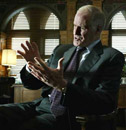
Interim leader Bill Graham
As Campbell Clark at the Globe and Mail tidily explains, Bill Graham’s comments about how the Liberals are not prepared to prop up Stephen Harper’s slender minority government when Parliament resumes April 3 have “put the other parties in the position of deciding whether the Liberals can afford to force another election, or whether it is more bluster than warning.” The “Liberal Party is set to embark on a wide-open leadership race that will not be decided until November or next February – depending on rules to be set next month – and it is not clear who would lead the party into an election if Mr. Harper’s government fell before then.”
Canada’s former prime minister Paul Martin, Campbell Clark goes on, “remains the titular leader of the party, but Mr. Graham, as Leader of the Opposition, has taken on all of the leader’s duties … Mr. Graham said the party leadership has assured him that they could make a quick decision on electing a leader, if necessary, and it would not necessarily be him or Mr. Martin. It could be anybody,’ he said.”
There have also been hints that Bill Graham’s still very new tenure as Liberal Official Opposition leader has already taken on something of a healing mission, amidst the apparently ongoing wars between Martinites and Chretienites inside the now-defeated natural governing party of Canada. Mr. Graham’s new chief of staff, e.g., will be Jane Stewart – a former Chretien cabinet minister, and the daughter of the former Ontario provincial Liberal leader Robert Nixon.
Jane Stewart’s father is also a self-confessed old agrarian “populist” (the very last of his breed in Ontario?), who seems to have had some warm relations with Jean Chretien in his own right. And this echoes an old-wool Ontario-Quebec sister-province tradition that goes back to the modern central Canadian Liberal founding coalition of Lafontaine and Baldwin, in the middle of the 19th century. (A period of great if now largely forgotten political soap opera in its own right – climaxing with 10 assorted coalition governments in as many years – to which the much more expansive Canada of the early 21st century sometimes seems eager to return.)
The appointments of both Bill Graham and Jane Stewart in the new intra-party interregnum suggest that the Liberal Party of Canada still has deeper resources of talent, tradition, political will, and binding glue than it is being given credit for by many insiders of other partisan stripes at the moment. But there is still no question that even Mr. Graham’s and Ms. Stewart’s party continues to be in a great deal of trouble, just on the face of things.
John Ibbitson’s theory of a while back, that the federal Liberals are ultimately headed in the same direction as the grand old Eaton’s cross-Canada department store chain, which finally went bankrupt a little further back again, may still be premature at best. But the January 23, 2006 election has helped breathe some fresh life into it. Who knows? However overblown it has been in the rest of the country, the Quebec sponsorship scandal just may have largely destroyed the federal Liberals in Quebec for a generation. They have not had serious traction in Western Canada for more than a generation – and Paul Martin, who was supposed to start changing this, was finally not able to do much. As the beginnings of the current leadership race spell out clearly enough, Canadian Liberalism today is in danger of becoming a largely Ontario franchise, with sort-of strong family ties in Atlantic Canada (and the very far north).
How far can the new New Democrat chutzpah (or is it hubris) go?
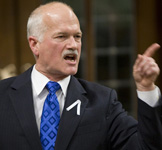
Jack Layton, standing up for the left as he sees it
 In a number of respects both federal and provincial politics in British Columbia today cast the harshest light on current Liberal fortunes – and there is some similar light shining from intriguing parallel angles in Quebec. BC is the best hope for any rising federal Liberal future in the West, and Quebec has been a crucial anchor of the Liberal past. But in the current provincial politics of both these third- and second-most populous provinces of Canada, Gordon Campbell’s and Jean Charest’s “Liberals” are the party on the conservative right, not the progressive left. (As the Liberals earlier finally became in Saskatchewan provincial politics too).
In a number of respects both federal and provincial politics in British Columbia today cast the harshest light on current Liberal fortunes – and there is some similar light shining from intriguing parallel angles in Quebec. BC is the best hope for any rising federal Liberal future in the West, and Quebec has been a crucial anchor of the Liberal past. But in the current provincial politics of both these third- and second-most populous provinces of Canada, Gordon Campbell’s and Jean Charest’s “Liberals” are the party on the conservative right, not the progressive left. (As the Liberals earlier finally became in Saskatchewan provincial politics too).
In BC provincial politics the party of the left is the New Democrats (as in Saskatchewan – and in Quebec it is of course the largely social democratic as well as sovereigntist Parti Quebecois). In the West both Saskatchewan and Manitoba currently have NDP provincial governments as well. And, unlike in Ontario, these NDP governments have been elected to office more than once – and now enjoy respectable track records as provincial administrators.
In the 2006 Canadian federal election the Western provincial political strength and left-wing leadership position of the New Democrats relative to the Liberals (outside the fourth most populous province of Alberta of course), came home to roost in what many now seem to see as an especially dangerous way for the Liberal Party of Canada.
 It is, in fact, even hard to make altogether serious sense of Jack Layton’s federal New Democrats’ broad political strategy since the defeat of the Martin government in Parliament this past November, without finally pointing to the longstanding New Democrat dream of ultimately supplanting the Liberals as the mainstream party of the progressive left in Canadian politics. (And the obvious loyal old British Commonwealth model here is how the Labour Party supplanted the Liberal Party in the United Kingdom, over the course of the 20th century.)
It is, in fact, even hard to make altogether serious sense of Jack Layton’s federal New Democrats’ broad political strategy since the defeat of the Martin government in Parliament this past November, without finally pointing to the longstanding New Democrat dream of ultimately supplanting the Liberals as the mainstream party of the progressive left in Canadian politics. (And the obvious loyal old British Commonwealth model here is how the Labour Party supplanted the Liberal Party in the United Kingdom, over the course of the 20th century.)
As it happens, the first opinion poll on federal party standings after the January 23 election has now lent some additional weight to this kind of scenario as well. A Decima Research survey conducted between February 9 and 13 suggests that, cross-Canada, 35% of respondents would vote Conservative, down only slightly from 36% on January 23. But the Liberals are at 25%, down five percentage points from the actual election. And the NDP is at 24% , up quite impressively from only 17.5% on January 23. (What’s more, even if you forget about Western Canada and Quebec, in Ontario the new Decima poll puts “the three main parties … in a virtual dead heat” – 31% NDP, 30% Liberals, and 29% Conservatives.)
As Decima’s Bruce Anderson has commented: “It’s not unusual to see the Liberal party number go down in this fashion, as they are, for all intents and purposes, between leaders.” At the same time, “the NDP number confirms yet again that the NDP enjoys a bigger opportunity than they have in the past, because of effective leadership communications and a fiscal situation that makes more NDP policy ideas seem affordable.”
Say whatever else you like, all this is quite dramatic in a number of respects. And all the talk about how the 2006 Canadian federal election has carried some real historic weight and heft would actually come true in at least one quite major way, if it did prove to be the start of a perhaps not-even-all-that-long process in which the New Democrats finally do supplant the Liberals as the mainstream party of the progressive left in Canadian federal politics.
At the same time again, whatever may or may not be happening here, it is very early days at best. And there are a host of reasons for remaining sceptical about the ultimate magnitude of the NDP’s current “bigger opportunity than … in the past.”
John Manley, to take just one case in point, recently alluded to the federal Liberals as “socially progressive and economically responsible.” It at least still seems a reasonable hypothesis that much of the great progressive anglophone Canadian middle class, in key parts of the country, continues to harbour big doubts about the economic responsibility of even Jack Layton’s New Democrats. And at the moment it is still very hard to see how the NDP can ever altogether seriously supplant the Liberals as the main party of the left, without finally winning over a much larger chunk of the economically responsible mass middle class, in all of rural, rurban, exurban, suburban, and urban Canada, coast to coast to coast.
 And then there is the whole question of the NDP in Quebec – as the former NDP premier of British Columbia Dave Barrett alluded to recently as well (see below). And that is just another story that induces further scepticism again. For the moment Jack Layton and Olivia Chow are, as the urbane John Barber has alluded to, the new “power couple” toast of downtown Toronto – with 13 federal seats out West in 2006 to the Liberals 14. But as Bill Graham has put it, the New Democrats and the Bloc Quebecois are also “the ones that created the Harper government.” And: “They’re the ones that are going to have to accommodate it.” That itself could prove just a big a challenge as anything the Liberals are facing now. And, unfortunately for the progressive cause in Canada at large, the new dysfunctional rivalry on the left may continue to keep some kind of smile on Prime Minister Stephen Harper’s face, for a little bit longer than needs to be.
And then there is the whole question of the NDP in Quebec – as the former NDP premier of British Columbia Dave Barrett alluded to recently as well (see below). And that is just another story that induces further scepticism again. For the moment Jack Layton and Olivia Chow are, as the urbane John Barber has alluded to, the new “power couple” toast of downtown Toronto – with 13 federal seats out West in 2006 to the Liberals 14. But as Bill Graham has put it, the New Democrats and the Bloc Quebecois are also “the ones that created the Harper government.” And: “They’re the ones that are going to have to accommodate it.” That itself could prove just a big a challenge as anything the Liberals are facing now. And, unfortunately for the progressive cause in Canada at large, the new dysfunctional rivalry on the left may continue to keep some kind of smile on Prime Minister Stephen Harper’s face, for a little bit longer than needs to be.
February 14-15: WISDOM FROM THE WEST .. January 23 tea leaves in Canadian federal politics are still unclear?
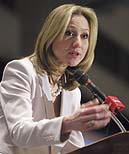
The lovely Belinda Stronach
TUESDAY, FEBRUARY 14. HAPPY VALENTINE’S DAY MS. STRONACH, MP. When even the New York Times calls your first week as prime minister of Canada an “Awkward Start,” you must be having some kind of trouble. And in the real world of Canadian federal politics this may mean that Stephen Harper’s slender Conservative minority government will finally not be able to govern audaciously all by itself (+ one former Liberal) – as if it had a majority in effect if not in fact.
Over the past weekend the central Canadian media mafia seemed to be concocting an alternate scenario. To start with, the Ontario provincial wing of the New Democrats expelled Canadian Auto Workers leader Buzz Hargrove from the party, because he was too friendly with Liberals. Then reporters on TV began to stress that, with former Liberal David Emerson’s defection to Prime Minister Harper’s new cabinet, Conservatives + New Democrats + the one Independent MP elected to the 39th Parliament now add up to a bare parliamentary majority of 155 seats.

Be my valentine
The wheels on this always somewhat bizarre alternate scenario, however, began to fall off before it left the garage. On Monday, February 13 federal New Democrat leader Jack Layton said he did not agree with his Ontario provincial wing’s expulsion of Buzz Hargrove. And there were parallel new noises. The New Democrats still shared child-care policy values with the Liberals (and conceivably even the Bloc Quebecois, led by the old cultural marxist Gilles Duceppe).
So what is really going on in Ottawa now anyway? It is time to seek more acute wisdom from the West, which Stephen Harper has brought into the federal corridors of power at last. And who better to turn to than the dynamic duo of Ted Byfield – a seasoned scourge of Western Canadian social conservatism from Alberta – and Dave Barrett, the former first New Democrat premier of BC? Read on at your own peril …
Ted Byfield’s February 11 “Oh Canada” column: “Jesus Christ … wasn’t always a Nice Guy, either …”

Ted Byfield, noted authority on Jesus in Alberta
Unlike some of Stephen Harper’s staunch right-wing Alberta supporters, Ted Byfield was not too upset about the appointments of former Liberal David Emerson and unelected Senator-designate Michael Fortier to the new cabinet. (In the very end: “Both appointees are highly respected in the private sector as men who get things done.”)
The elder Byfield – his son Link is also in the Alberta public eye – was more concerned about the failure to give strong social conservative Jason Kenney a front-line cabinet job (even allowing for Kenney’s ultimate placing as parliamentary secretary to the prime minister himself). And Stockwell Day’s appointment as Minister of Public Safety was no consolation to Ted Byfield: “Day is no Jason Kenney. He’s what might be called a Nice-Guy Christian,’ unlikely to make trouble in Cabinet. Kenney is not a Nice-Guy Christian and, if he saw social conservatism being quietly dumped, could make great trouble. (Jesus Christ, as somebody recently pointed out, wasn’t always a Nice Guy, either. That’s why they crucified him.)”
Viewed from back east, Ted Byfield’s February 11 “Oh Canada” column also offered an intriguing point of view on what seems to have become the current hot-button child-care policy issue – kicked-off by Prime Minister Harper’s initial announced intention to scrap the Liberal child-care program and replace it with direct cheques. As for the new prime minister’s “plan to pay federal subsidies direct to parents, rather than set up a state-run day-care system,” the elder Byfield wrote, “he has also signaled Quebec and Ontario that he won’t withhold the federal funding for their projected state systems, thereby helping to establish a state system in the two biggest provinces where five-eighths of the Canadian population live.”
So much, it would seem, for the notion that Western Canadian conservatives want to see more power going to the provincial governments. Ted Byfield at least would apparently like to see all 10 provinces falling into line with the right-wing gospel forged in the new Alberta heartland, where almost any kind of social and/or economic policy can work, so long as the price of oil and related provincial resource rents keep going up and up. Now that the West is in at last, it would appear that Mr. Byfield is not all that averse to seeing federal government muscle used more expansively, for the right kinds of goals.
Left Coast echoes of the new cross-Canada patriotism?
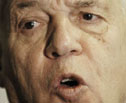
Dave Barrett, former BC NDP Premier: whadda guy
At the opposite end of the Western Canadian ideological spectrum, former New Democrat premier of BC Dave Barrett has lately almost seemed to echo Ted Byfield’s newfound concern for more aggressive federal government policy.
In a February 8 interview with Kamloops This Week, the now 75-year-old Mr. Barrett, in the midst of a book tour, offered a wide variety of his characteristic feisty opinions on current and past events on Canada’s Pacific Coast, and in the country at large, from coast to coast to coast.
Among other things, he suggested that there is “no difference … none whatsoever” between new federal Conservative Prime Minister Stephen Harper and current Liberal Premier of BC Gordon Campbell. But the “national and provincial media have chosen to ignore this issue … because of their lack of independence and inherent bias.”
Mr. Barrett also confessed that he “does not stand above jumping into the metaphorical bed with other politicians.” After he first became premier of BC in 1972, he recalled, “I announced that I’d make political love to Rene Levesque” – the founder of the modern sovereigntist Parti Quebecois in Quebec provincial politics, and a “man of great compassion and common sense.” Alas, even after some extended conversation, “their talk about putting to rest regional conflicts for the sake of concentrating on social policy never bore fruit.”

Standing on guard for thee
Even so, Kamloops This Week reported early in 2006: “This is a confederation,’ Barrett said about the Great White North. The jingoism of regional patriotism is a very dangerous thing as we see with Quebec trying to separate from Canada.’ Concentrating on regionalism, Barrett warned, would eventually make Canada a part of the United States.” And who knows? Perhaps here as in Ted Byfield’s case, there really is some kind of new and even vaguely hopeful and optimistic Western wisdom, about what is finally going to transpire in Ottawa, over the life of the newly fractured 39th federal Parliament? Vive le Canada libre?

